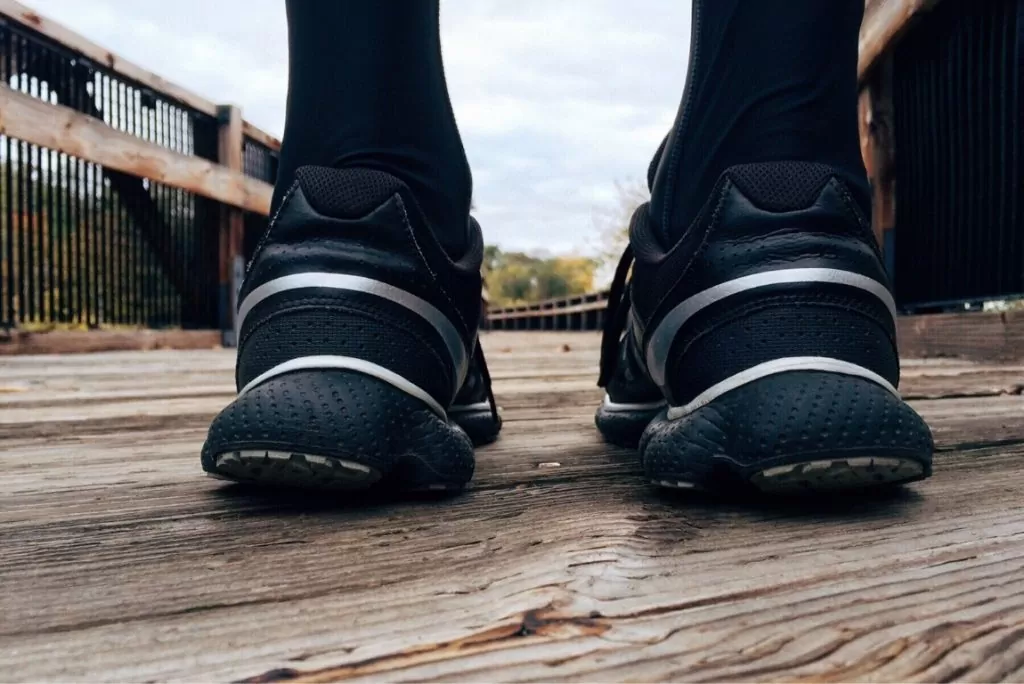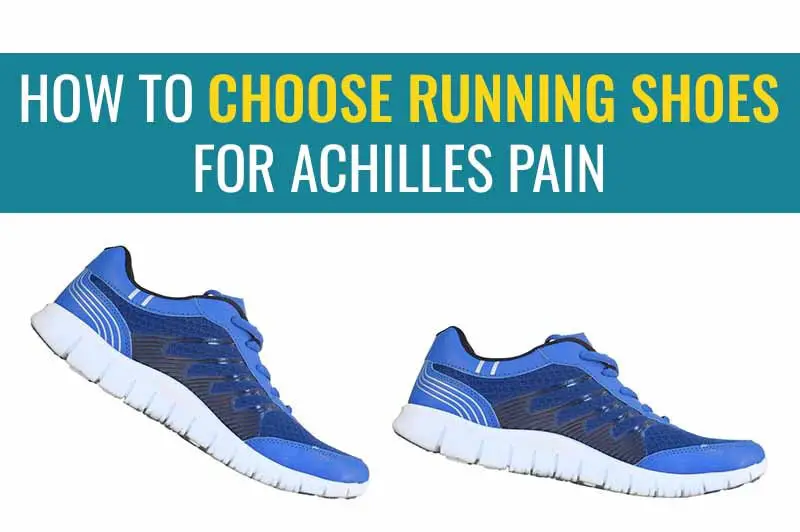For Achilles Tendonitis, the best trainers are those with ample cushioning and arch support. When suffering from Achilles Tendonitis, wearing the right trainers can make a significant difference in managing and preventing further discomfort.
The right pair of trainers with proper cushioning and arch support can help alleviate pressure on the Achilles tendon, promote proper foot alignment, and provide overall comfort for daily activities or exercise routines. Investing in high-quality trainers designed specifically for Achilles Tendonitis can aid in supporting the healing process and ensuring optimal foot health.
To help you make an informed decision, we have compiled a list of top-rated trainers that are recommended by podiatrists and athletes alike for their effectiveness in addressing Achilles Tendonitis.
What Is Achilles Tendonitis?
Achilles tendonitis is a common injury that occurs when the Achilles tendon, which connects the calf muscles to the heel bone, becomes inflamed. This condition often affects athletes who engage in activities that require repetitive movements, such as running and jumping. It can also develop in individuals who suddenly increase the intensity or duration of their physical activities. Achilles tendonitis can cause discomfort and affect mobility, making it essential to find the best trainers to provide support and alleviate symptoms.
Causes Of Achilles Tendonitis
The main causes of Achilles tendonitis include overuse of the tendon, improper footwear, tight calf muscles, and sudden increases in physical activity. Overuse and repetitive stress on the Achilles tendon can lead to microscopic tears and inflammation, while inadequate support from footwear can exacerbate the condition. Tight calf muscles can increase strain on the tendon, contributing to the development of Achilles tendonitis.
Symptoms Of Achilles Tendonitis
Symptoms of Achilles tendonitis may include pain and stiffness in the tendon, particularly in the morning or after physical activity. Swelling and tenderness along the tendon, as well as difficulty flexing the foot, are common indicators of the condition. Individuals with Achilles tendonitis may also experience a thickening of the tendon and develop bone spurs in the heel area.
Diagnosis Of Achilles Tendonitis
Diagnosing Achilles tendonitis typically involves a physical examination to assess for swelling, tenderness, and range of motion. Imaging tests such as ultrasound or MRI may be recommended to visualize the tendon and assess the extent of the injury. Medical professionals may also evaluate the individual’s medical history and activity level to form a comprehensive diagnosis and develop an effective treatment plan.
Importance Of Proper Footwear
Choosing the right footwear is critical for managing Achilles Tendonitis. Improper shoes can exacerbate the condition, while suitable trainers can alleviate discomfort and aid in recovery.
Impact Of Footwear On Achilles Tendonitis
Wearing inappropriate shoes with inadequate support or cushioning can increase strain on the Achilles tendon.
Features To Look For In Trainers For Achilles Tendonitis
- Arch Support: Opt for trainers with proper arch support to reduce stress on the Achilles tendon.
- Cushioning: Look for shoes with ample cushioning to absorb shock and minimize impact on the tendon.
- Heel Counter: Select shoes with a firm heel counter to stabilize the heel and provide additional support.
- Flexibility: Choose trainers that offer flexibility in the forefoot to prevent excessive pressure on the tendon.
- Fit: Ensure a proper fit to prevent rubbing or chafing that can aggravate the Achilles tendon.
By prioritizing these features when selecting trainers, individuals with Achilles Tendonitis can experience improved comfort and better manage their condition effectively.
Top Features To Consider
Cushioning And Shock Absorption
Impact cushioning is crucial for reducing strain on the Achilles tendon.
Arch Support
Proper arch support helps in maintaining the foot’s natural alignment.
Heel Counter
A firm heel counter provides stability and aids in preventing excessive pronation.
Flexibility
Shoes with flexibility allow natural foot movement, reducing strain on the Achilles tendon.
Traction
Good traction ensures secure footing and helps in preventing slips and falls.

Credit: www.clickphysiotherapy.com.au
Best Trainers For Achilles Tendonitis
If you’re dealing with Achilles Tendonitis, finding the right pair of trainers is essential to provide the proper support and cushioning for your feet. The right trainers can help alleviate pain and prevent further injury, making it crucial to choose footwear specifically designed for this condition. Here, we’ve curated a list of the best trainers for Achilles Tendonitis, each offering unique features to support your recovery and ensure comfort during physical activity.
Trainer 1
Made with lightweight materials and featuring ample cushioning, Trainer 1 is designed to provide exceptional support for those with Achilles Tendonitis. Its shock-absorbing sole and arch support help alleviate pressure on the tendon, making it an ideal choice for individuals seeking long-lasting comfort and stability.
Trainer 2
With a focus on motion control and stability, Trainer 2 is engineered to promote proper foot alignment while offering superior cushioning. Its breathable mesh upper and padded collar ensure a secure yet comfortable fit, making it a reliable option for individuals dealing with Achilles Tendonitis.
Trainer 3
Designed with a reinforced heel and soft insole, Trainer 3 prioritizes heel protection and support. Its flexible construction allows for natural foot movement while providing the necessary shock absorption to reduce strain on the Achilles tendon, making it a favorable choice for those seeking relief and comfort.
Trainer 4
Featuring a wider toe box and enhanced cushioning, Trainer 4 prioritizes comfort and room for natural toe splaying. Its responsive midsole and heel cushioning support the foot’s natural motion, offering a suitable option for individuals with Achilles Tendonitis seeking versatile and adaptive footwear.
Trainer 5
Engineered with a durable outsole and supportive midfoot construction, Trainer 5 is designed to provide stability and impact protection. Its breathable yet supportive design makes it an excellent choice for individuals looking for a combination of comfort and durability to accommodate Achilles Tendonitis.
Tips For Choosing The Right Trainer
When it comes to selecting the best trainers for Achilles tendonitis, there are a few key factors to consider. The right pair of shoes can make a significant difference in your comfort and recovery, so it’s important to choose wisely. Here are some tips to help you find the perfect fit:
Consult A Podiatrist
Before purchasing any trainers, it is strongly recommended to consult a podiatrist. A professional evaluation will help you understand the specific needs and requirements of your feet. A podiatrist can provide valuable insights into what features to look for in a pair of shoes and give you guidance on selecting the most suitable option for your Achilles tendonitis. Remember, their expertise goes a long way in ensuring a proper fit and support.
Try On Different Options
Trying on different trainers is essential to find the right fit. It’s important to physically test the shoes and evaluate how they feel on your feet. Every brand and model can have variations in sizing and fit, so don’t rely solely on your usual size. Take the time to try on different options and pay attention to how they feel when walking or running. Ensure that there is enough room in the toe box and that the shoe provides ample support for your Achilles tendon.
Assess Comfort And Fit
Comfort is paramount when it comes to finding the best trainers for Achilles tendonitis. Evaluate how the shoes feel against your feet, focusing on areas that are prone to discomfort or pain. Look for cushioning in the heel and arch support to help alleviate pressure on the Achilles tendon. It’s advisable to walk or run in the shoes to get a real sense of their fit and how they respond to your movements. Remember, a comfortable shoe is one that supports your foot without causing any discomfort or pain.
Consider Personal Needs And Preferences
In addition to the essential features, it’s important to consider your personal needs and preferences. Think about the type of surface you will be using the trainers on, whether it’s pavement, trails, or the gym. This will help determine the type of soles you should choose for optimal traction and stability. Additionally, consider factors such as shoe weight, breathability, and overall aesthetics that will make your wearing experience more enjoyable. By considering both your needs and preferences, you can find a pair of trainers that not only supports your Achilles tendon but also aligns with your personal style.
By following these tips, you can make an informed decision when selecting the best trainers for Achilles tendonitis. Remember, the right pair of shoes can help alleviate pain, provide support, and contribute to your overall recovery. Consulting a podiatrist, trying on different options, assessing comfort and fit, and considering personal needs and preferences are crucial steps in finding the perfect trainers for your specific needs.

Credit: sarahscoop.com

Credit: prideplus.com.au
Frequently Asked Questions For Best Trainers For Achilles Tendonitis
What Are The Best Trainers For Achilles Tendonitis?
The best trainers for Achilles tendonitis are those that provide proper cushioning and support to the heel and arch of the foot. Look for shoes with a low heel-to-toe drop, good shock absorption, and arch support. Brands like ASICS Gel Nimbus, Brooks Ghost, and Nike Air Zoom Pegasus are highly recommended for Achilles tendonitis.
What Features Should I Look For In Trainers For Achilles Tendonitis?
When choosing trainers for Achilles tendonitis, look for shoes with excellent heel cushioning, arch support, and shock absorption. A shoe with a low heel-to-toe drop and a flexible forefoot is also beneficial. Additionally, consider shoes with breathable material and a lightweight design to reduce strain on the feet.
Can Wearing The Wrong Trainers Worsen Achilles Tendonitis?
Wearing the wrong trainers can indeed worsen Achilles tendonitis. Ill-fitting shoes with inadequate support and cushioning can put unnecessary strain on the Achilles tendon, exacerbating the condition. It is vital to invest in quality trainers that are specifically designed to alleviate the symptoms of Achilles tendonitis.
How Often Should I Replace My Trainers If I Have Achilles Tendonitis?
If you have Achilles tendonitis, it is recommended to replace your trainers every 300-500 miles or every 6-12 months, depending on your level of usage. Over time, the cushioning and support in trainers wear out, which can lead to increased stress on the Achilles tendon.
Conclusion
Finding the best trainers for Achilles tendonitis is crucial for preventing and managing discomfort. The right footwear can provide the necessary support and cushioning, helping to alleviate strain on the affected area. By carefully selecting well-fitting, supportive, and stable trainers, individuals with Achilles tendonitis can continue to stay active while minimizing the risk of aggravating their condition.



